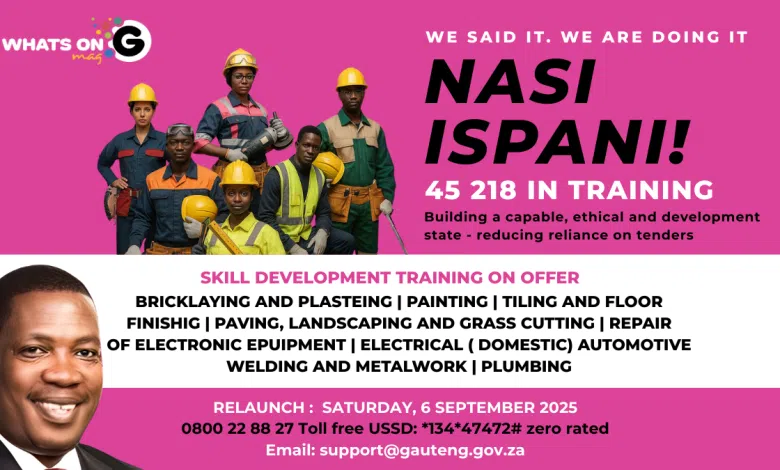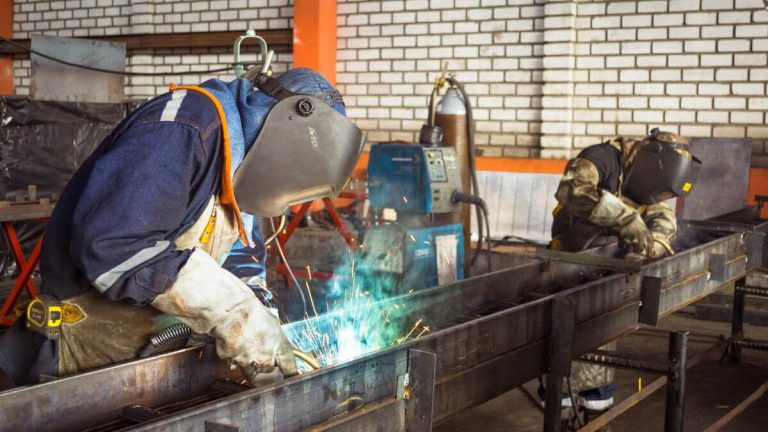Welding is more than just joining metal; it is a gateway to South Africa’s industrial and economic growth. From bridges and skyscrapers to mining equipment and pipelines, welders form the backbone of infrastructure and manufacturing.
Thank you for reading this post, don't forget to subscribe!As the country expands its industries, skilled welders are in higher demand than ever before. Therefore, welding has become one of the best trades for young people to enter if they want long-term stability and global opportunities.
What is the Nasi iSpani Programme?
The Nasi iSpani initiative, launched by the Gauteng Provincial Government, is a large-scale employment and skills programme. Relaunched in 2025, it offers over 45,000 training and job opportunities for unemployed youth in Gauteng.
This programme matters because it directly tackles unemployment by equipping participants with market-ready skills. Moreover, it bridges the gap between education and practical industry needs, especially in critical trades such as welding.

Welding Training Through Nasi iSpani
Through Nasi iSpani, aspiring welders gain hands-on training supported by theoretical learning. In addition, participants benefit from financial stipends, which allow them to focus on developing their skills instead of worrying about basic expenses.
The programme is not only about training but also about empowerment. As a result, youth who complete it are better prepared to meet the demands of industries such as construction, mining, and manufacturing.
Stipends Offered: How Much Can You Earn While You Train?
| Qualification Level | Monthly Stipend |
|---|---|
| Entry-level | R1,200 |
| Certificate Level | R3,000 |
| Diploma Level | R4,500 |
| Advanced/Technical | R6,000 |
Why Welding is Classified as an Occupation in High Demand (OIHD)
The Department of Higher Education and Training (DHET) regularly updates the Occupations in High Demand (OIHD) list. Welding, especially “Double Coded Welder”, is featured due to its critical role in infrastructure and its global demand. For job seekers, this means greater training opportunities, bursaries, and employment prospects.
Understanding the OIHD: What it Means for Job Seekers
The OIHD list highlights professions that are scarce but essential to the economy. It also guides government and training providers on where to invest resources.
For young people, this means choosing a career like welding is not a gamble. Instead, it is a smart investment in a field where employment prospects are strong both locally and globally.
Welding Career Paths Beyond Nasi iSpani
- Employment: Construction, mining, manufacturing, shipbuilding, and automotive industries.
- Entrepreneurship: Start a small welding business offering custom gates, furniture, or repairs.
- Advanced Roles: Specialised fabrication, offshore welding, or international contracts.
Welding Salaries in South Africa: Entry-Level to Experienced
- Entry-level welders: R6,000 – R10,000 per month.
- Mid-level/experienced welders: R12,000 – R25,000 per month.
- Specialist welders (coded/pipe/underwater): R30,000+ per month.
Gauteng typically offers higher salaries due to its industrial base.
Gauteng vs. Other Provinces: Welding as a Career
Gauteng
Highest demand due to construction and manufacturing hubs. Salaries also top the national averages.
North West
Mining drives demand for welders in platinum and gold sectors.
Mpumalanga
Power stations and coal mines provide steady employment.
Limpopo
Welding needed in mining and growing infrastructure projects.
Eastern Cape
Automotive manufacturing boosts welding careers.
Western Cape
Shipyards and construction offer opportunities.
KwaZulu-Natal
Ports and industrial hubs require welders.
Northern Cape
Mining (iron ore, manganese) fuels demand.
Free State
Agricultural machinery and mining maintain steady welding jobs.
Specialized Welding Roles and Their Pay
- TIG Welding: Precision welding, high salaries.
- MIG Welding: Used in automotive and manufacturing.
- Pipe Welding: Critical in oil, gas, and mining — pays R25,000+.
- Underwater Welding: Among the highest-paying, globally sought after.
Skills Needed to Succeed as a Welder
- Attention to detail
- Physical stamina
- Strong safety awareness
- Technical knowledge of welding machines and materials
Welding Qualifications and Certificates
- TVET Colleges: Offer N1–N3 welding courses.
- Private Training Centres: SETA-accredited certifications.
- International Certifications: AWS, ISO standards for global mobility.
Welding Demand in the Future: Local and Global Outlook
South Africa’s infrastructure rollout will sustain welding demand locally, while international opportunities continue to grow. Countries such as Australia and the Middle East actively recruit South African welders.
Benefits of Pursuing Welding as a Career
- High demand locally and internationally.
- Skills are portable and globally recognised.
- Opportunities for upskilling into inspector, supervisor, or technologist roles.
Challenges in the Welding Profession
- Physically demanding work.
- Safety risks from heat, sparks, and fumes.
- Certifications require constant renewal to stay competitive.
How to Apply for Nasi iSpani Welding Training
- Toll-Free Call: 0800 233 772
- USSD Code: 134474727#
- Email: [email protected]
Also check: False Bay TVET College Internships 2025
FAQs: Welding Careers and Nasi iSpani
1. What is the duration of the welding training?
The training typically runs between 6 months and 12 months, depending on the level and qualification pathway. Some short courses may be shorter, while advanced training could take longer.
2. Do I need matric to apply for welding training?
No, matric is not always required. Nasi iSpani offers opportunities for people with different educational levels, though having Grade 9–12 can be an advantage.
3. Is the training accredited?
Yes. The welding training is accredited through SETA and aligns with DHET standards, ensuring qualifications are recognised by employers across South Africa.
4. Can women apply for welding training?
Absolutely! Welding is often male-dominated, but women are encouraged to apply. The industry increasingly supports gender inclusivity.
5. What age group qualifies for Nasi iSpani?
Nasi iSpani mainly targets youth between 18 and 35 years, but some streams may allow slightly older applicants if opportunities are available.
6. Will I get a job after completing training?
Employment is not guaranteed, but the training is designed to boost employability. Welding is on the Occupations in High Demand list, which means opportunities are stronger than in many other fields.
7. Can I study further after Nasi iSpani?
Yes. You can continue your studies at a TVET college or private provider, or pursue advanced welding certifications (like coded welding, TIG, MIG, or international certifications).
8. Does welding allow international work opportunities?
Yes. South African welders are highly sought after overseas, especially in countries with large mining, oil, and construction sectors like Australia, Canada, and the Middle East.
9. What safety measures are taught during training?
You’ll be trained on protective gear usage, workplace safety standards, fire prevention, and handling hazardous materials to ensure safe working conditions.
10. Is welding suitable for someone with no prior technical background?
Yes. Beginners are welcome, as the training starts with basic theory and hands-on practice before moving into advanced techniques.
Also check: Top 50 Highest-Paying Entry-Level Jobs in South Africa Right Now
Becoming a welder through Nasi iSpani is more than a training opportunity; it’s a path to stability, growth, and financial independence. With stipends to support learning and welding’s classification as an Occupation in High Demand, Gauteng youth have a golden chance to shape their future in a trade that truly builds nations.




